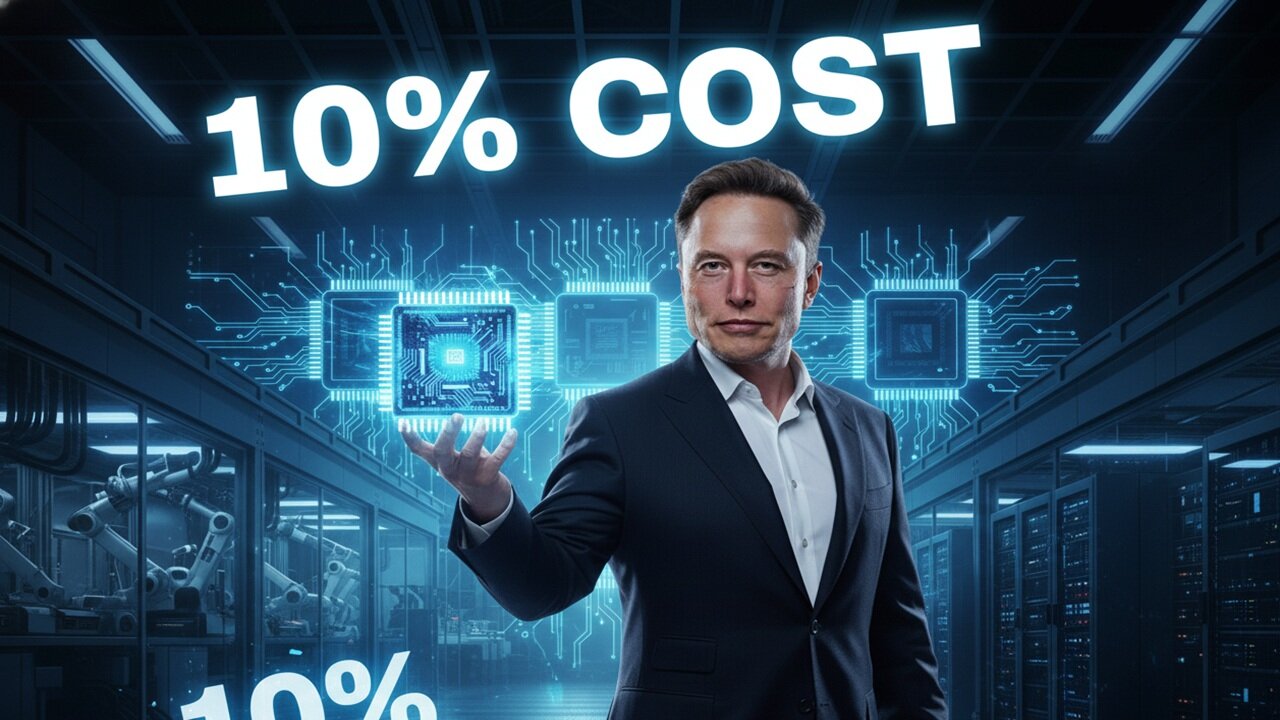Premium Only Content

Tesla Kills Nvidia? Intel Partnership Promises 10% Cost AI Chips
The potential Tesla-Intel chip partnership is set to dramatically reshape the AI hardware landscape, offering AI chips that could cost just 10% of Nvidia’s manufacturing cost. This is a strategic development that enterprise technology leaders cannot afford to ignore.
On November 6, 2025, Tesla CEO Elon Musk publicly announced that the company is considering collaborating with Intel to produce its fifth-generation AI chips (AI5). This signal of a major strategic shift sent Intel shares soaring 4% in after-hours trading.
Why the Shift?
Tesla is moving away from sole reliance on traditional partnerships, such as those with TSMC and Samsung, because current suppliers cannot address the "significant supply constraint" needed for volume. Musk stated that extrapolating the best-case scenario for chip production from current suppliers is "still not enough". This necessity has prompted Tesla to consider building what Musk calls a “terafab”—a massive chip fabrication facility capable of at least 100,000 wafer starts per month, representing a gigantic expansion of manufacturing scale.
The Performance Claims & Economic Impact:
Musk claims that the Tesla AI5 chip would not only cost just 10% as much to manufacture as Nvidia’s flagship Blackwell chip, but it would also consume approximately one-third of the power used by the Blackwell chip. The chip is designed to be inexpensive, highly power-efficient, and optimized for Tesla’s own software. These cost and efficiency projections, if realized, could fundamentally alter the economics of AI deployment.
Strategic Implications:
For Intel, this potential collaboration is a crucial opportunity, as the US chipmaker desperately needs external customers for its newest manufacturing technology and has significantly lagged behind Nvidia in the AI chip race. Furthermore, the US government recently acquired a 10% stake in Intel, underscoring the strategic importance of maintaining domestic chip manufacturing capabilities.
Enterprise decision-makers must monitor this closely, as the potential partnership raises key strategic considerations:
1. Supply Chain Resilience: A move toward domestic manufacturing addresses concerns about supply chain concentration in Asia.
2. Cost Structure Changes: If cost targets are met, there will be potential price pressure on current suppliers, forcing organizations to evaluate alternative chip architectures.
3. Innovation Pace: Tesla's aggressive timeline, with small AI5 production in 2026, high volume in 2027, and the AI6 chip targeted for volume in mid-2028, suggests an accelerating pace of AI hardware innovation.
The AI chip landscape is entering a period of flux. Organizations should maintain flexibility in their infrastructure strategies to gain access to cost-effective, high-performance AI infrastructure in the coming years.
--------------------------------------------------------------------------------
Metadata Tags (Comma Separated)
Tesla, Intel, Nvidia, AI chips, AI5 chip, Elon Musk, manufacturing cost, chip partnership, semiconductor, terafab, domestic chip manufacturing, supply chain resilience, AI hardware, Blackwell chip, TSMC, Samsung, technology sovereignty, strategic analysis, supply chain.
--------------------------------------------------------------------------------
Best Searchable Hashtags
#Tesla #Intel #Nvidia #AIChips #ElonMusk #Semiconductor #AIHardware #Terafab #ChipPartnership #TechNews #AI5 #SupplyChain #FutureofAI
-
 11:13
11:13
MattMorseTV
19 hours ago $51.71 earnedRINO PLOT just got SHUT DOWN.
54.8K150 -
 31:07
31:07
Camhigby
3 days agoLeftist Claims Gender Goes By Identity, Then FLOUNDERS When Asked This Question!
152K85 -
 LIVE
LIVE
Shield_PR_Gaming
4 hours ago11/22/25 I Let's Level up on Battlefield and other games as well!
220 watching -
 10:21
10:21
MetatronGaming
11 hours agoI spent $200 for this Premium PS5 Controller. Is it worth it?
16.6K10 -
 13:46
13:46
Nikko Ortiz
19 hours agoYour Humor Might Be Broken...
48.5K5 -
 1:20:58
1:20:58
CopperheadRoadPodcast
1 day agoEPISODE 91: DAVE SMITH HAS A TRIGGERNOMETRY PROBLEM! GUEST Larry Oberheu
4811 -
 26:35
26:35
The Bryce Eddy Show
21 hours agoDaniel Harmon: The Storytelling Genius Behind Tuttle Twins
415 -
 46:47
46:47
The Heidi St. John Podcast
1 day agoFan Mail Friday: Holding the Line in a Divided Culture
403 -
 9:26
9:26
MattMorseTV
1 day ago $51.84 earnedPam Bondi is in HOT WATER.
67.2K236 -
 16:38
16:38
MetatronGaming
17 hours agoAnno 117 Pax Romana looks INCREDIBLE
91.6K12